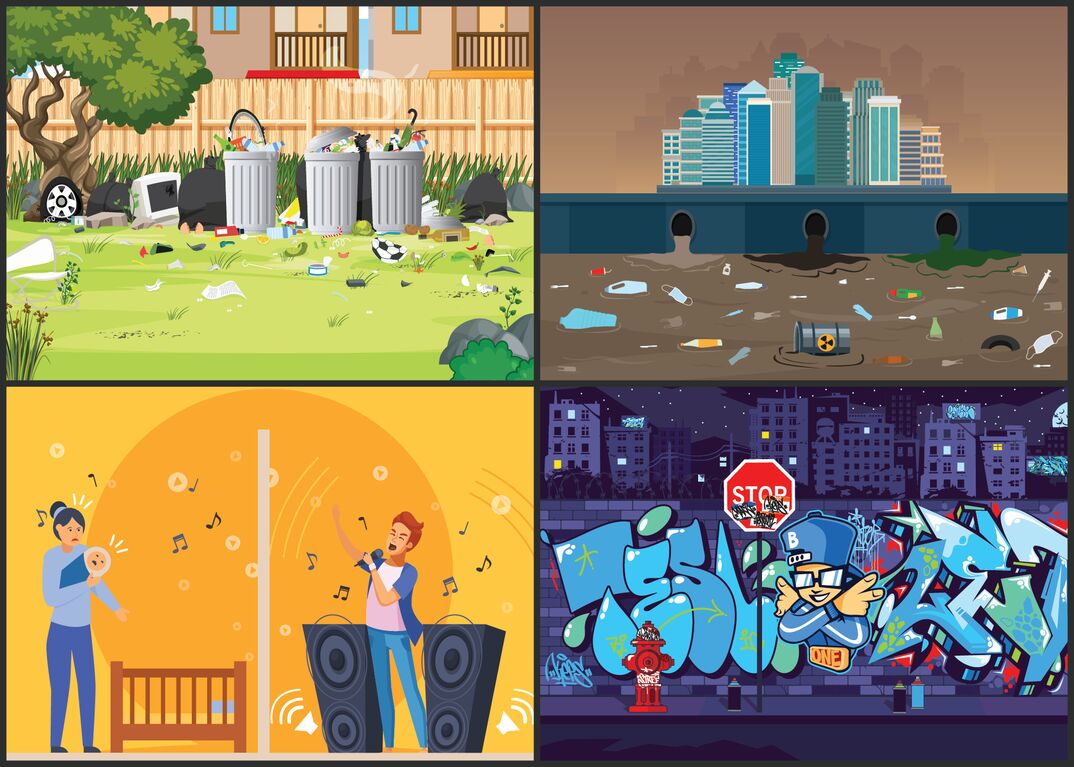- AppliancesElectriciansHVACLandscapingLocksmithPest ControlPlumbingRenovationRoofingT V RepairAll Home Improvement
- Car AccidentClass ActionCorporate LawCriminal DefenseDivorce LawEmployment LawFamily LawFinancial LawLegal AidMedical Injury LawyersMedical MalpracticeReal Estate LawWater Fire RestorationAll Legal
- InvestmentRetirementAll Finance
- Animal InsuranceAutoGeneral InsuranceHealth PolicyHome RentersAll Insurance
- DentalHealth SpecialistsAll Medical
- Animal CareVeterinaryAll Pets
- Auto GlassTowingAll Automotive
What Is a 'Public Nuisance' in Terms of the Law?

When you look at the general definition of the word "nuisance," you can probably think of several examples from your life: a coworker who won't stop complaining, a roommate who won't clean up or a car alarm that wakes you up in the middle of the night.
But, legally, there’s a line between a disturbance or annoyance and a public nuisance. Here’s how to know if what you're dealing with crosses that line.
Legally, a public nuisance is any situation that interferes with the rights of the public to enjoy their property. It can be an action that's considered offensive, indecent, harmful to health or an obstruction of how property is used. To be considered a public nuisance, it has to affect a larger group of people, instead of only annoying one person on an individual level. It's usually something that makes it difficult for several people to enjoy their lives or use their property as they want. The specific laws and what constitutes a public nuisance can vary by state.
A situation can also be a private nuisance. This happens when it only affects one person or a small group of people, rather than the general public. For example, if a neighbor's tree falls across your driveway, that's a private nuisance because you're the only one affected by it.
What Kind of Actions Make Someone a Public Nuisance?
A public nuisance can include any behavior that affects the rights of the general public. They're things that interfere with your quality of life. Some examples of public nuisances include:
- Loud noises, such as blaring music
- Something obstructing a public road or alley
- Storing flammable or explosive materials
- Overgrowth of weeds or brush
- Trash piled in the yard
- Vehicles parked in yards over long periods
- Water pollution
- Illegal drug use
- Illegal activities such as gambling or prostitution
- Graffiti
- Dangerous animals
More Related Articles:
- When Do You Need a Lawyer? Determine If You Need to Hire an Attorney
- What Is a Class-Action Lawsuit?
- What Is a Misdemeanor?
- What to Do After a Car Accident
- What Is Power of Attorney?
How you report a public nuisance can depend on what type of nuisance it is. The department that handles complaints might vary by jurisdiction and type. Your local health department might accept complaints about a situation that causes a risk to public health. Other departments that might take the lead depending on the situation include the local code compliance office, police department, housing department, animal control or fire department.
Consider the type of threat or violation to identify the right option for reporting the incident. Many municipal departments only provide information about reporting these situations. If you're not sure where to turn, try calling the nonemergency line for your local police department, or look for a general number for your city or county for guidance.
The method of reporting can also vary. Some departments offer online reporting methods, while others require you to call to submit a complaint. This information should be available online with instructions on how to proceed.
What Are the Consequences of Causing a Public Nuisance?
The way a public nuisance situation is handled can vary. Laws and consequences are often different based on local and state regulations. It can also depend on the type of violation.
Some violations might result in a warning the first time. The city, county or other jurisdictions might demand abatement of the nuisance. For example, if the situation is an overgrowth of brush that's blocking the sidewalk or a yard overgrown with weeds, the homeowner might have a certain amount of time to remove it.
The person who causes the public nuisance might face fines if there are ordinances in place that prohibit the actions. For example, some communities have noise ordinances in place that include fines for violations. If the public nuisance relates to a loud noise that violates that ordinance, the person could be hit with a fine.
Elocal Editorial Content is for educational and entertainment purposes only. The information provided on this site is not legal advice, and no attorney-client or confidential relationship is formed by use of the Editorial Content. We are not a law firm or a substitute for an attorney or law firm. We cannot provide advice, explanation, opinion, or recommendation about possible legal rights, remedies, defenses, options or strategies. The opinions, beliefs and viewpoints expressed by the eLocal Editorial Team and other third-party content providers do not necessarily reflect the opinions, beliefs and viewpoints of eLocal or its affiliate companies. Use of the Blog is subject to the
Website Terms and Conditions.The eLocal Editorial Team operates independently of eLocal USA's marketing and sales decisions.



